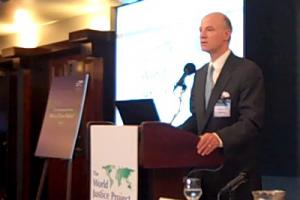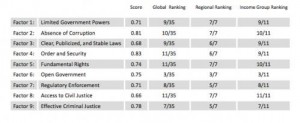
William Hubbard, chairman of the World Justice Project board of directors, speaks at the National Press Club. (Photo by Karen Frantz)
This article was first published in the American Observer.
The United States ranks last out of 11 other developed countries on citizens’ perceptions of the fairness and strength of their civil justice system, according to a study released Thursday by the World Justice Project in Washington, D.C.
Juan Carlos Botero, the director of the Rule of Law Index for the project, said that poverty is likely a reason the U.S. ranks low on perceptions of civil justice. “One in every five low-income Americans have access to the legal assistance they need,” he said.
The 2010 Rule of Law Index surveyed 41,000 people and 900 experts representing 35 countries, 11 of them developed, about how they perceive the state of justice in their countries.
People were asked about the effectiveness of the criminal and civil justice systems, the protection of fundamental rights, the presence of government corruption and other elements that affect the rule of law.
The findings were discussed at a press conference at the National Press Club on Thursday.
Although the study found the U.S. ranks high in terms of the strength of its criminal justice system, it found the U.S. lags behind its peers with respect to the affordability of legal counsel in civil disputes, unreasonable delays within the justice system and the effective enforcement of civil justice.
The study found that there was a large gap between high-income and low-income individuals in terms of how satisfied they said they were with the U.S. court system. Among high-income individuals who had used the court system in the past three years, 71 percent reported that the process was fair, compared with 40 percent of low-income individuals.
Moreover, the gap between the wealthy and the poor on satisfaction with the civil courts system was much wider in the U.S. than in many other countries, such as France, South Korea and Spain, where satisfaction was essentially uniform.
The World Justice Project’s central aim is to advance the rule of law around the world, according to its website.
William Hubbard, chairman of the World Justice Project’s board of directors, said that justice and the rule of law are important because they enable nations to thrive and advance.
“The rule of law matters,” he said. “It doesn’t just matter to lawyers and judges. It matters to all citizens.”

This table presents aggregate scores by factor for the United States in comparison with its regional and socioeconomic peers. (Courtesy of the World Justice Project)
Brackett Denniston, senior vice president and general counsel of General Electric, said that the rule of law is also important for economic development. He said that corruption in many areas of the world destroys the ability for people to do business.
“The rule of law has a great deal to do with how we invest, where we invest,” he said.
Denniston said he expects that the findings of the Rule of Law Index, the first such study the project has produced after a three-year effort, to help spur advancements in justice around the world.
“This kind of tool is exactly what is most important,” said Ellen Gracie Northfleet, Brazilian judge and former chief justice of the Supreme Court of Brazil, “a tool in the index where we can exchange our intuitive knowledge of what’s wrong and what’s right for measurable data. And we can, from there on, acknowledge our progress.”